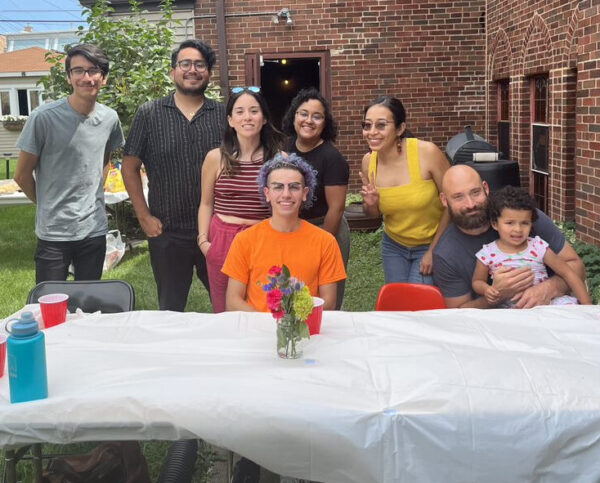Q&A with Irene Romulo, Development and Community Engagement Coordinator, Cicero Independiente, and Jesus J. Montero, steering committee member
The Project…
General Operating Support
Location: Cicero, Illinois
Cicero Independiente received funds in November 2022 to support the organization’s operations.

The Organization…
Cicero Independiente
Cicero Independiente was founded in 2019 by three Cicero residents who decided to launch a newsroom to fill a critical lack of investment in independent bilingual news coverage specifically for communities of color in the southwest suburbs.
Follow @CiceroIndependiente / @CiceroNoticias: Website | Facebook | Instagram | Twitter
Sign up for Cicero Independiente’s monthly newsletter to receive good news about Cicero and Berwyn. Contact Cicero Independiente at info@ciceroindependiente.com.
Featured Image: Youth reporter Jorge Martinez facilitates a panel about how to run for office in Cicero and Berwyn. Photo by Jesus J. Montero.
The Q&A…
Q: How do you see the arts/culture/humanities as being essential?

Irene Romulo and Jesus J. Montero: Cicero’s demographics started changing during the early 90s. Since then, Cicero has transformed into one of the most Latinx cities in the country. Unlike some neighborhoods in Chicago, however, our streets do not have any murals, signs or streets honoring our diverse cultures–such things are difficult to get approved by local authorities. Local archives have rarely documented our existence, let alone our achievements, resilience and joy. This has led many people, including myself, to feel disconnected from the area despite having grown up here. It is hard to connect to a place that seems hesitant, still, to adapt to and center our well-being.
But we’re changing that. Using journalism and art, we’re ensuring that people feel like they belong here. We’re changing culture and using this artform to demonstrate that the people who live here are important and respected enough to be listened to and presented with the truth. That their well-being matters and that they should participate when important decisions are made about their lives. We’re highlighting all of our complexities and identities as well as uplifting the visionaries who are addressing the systemic issues affecting us. Our journalism today is documenting our lives for the future and letting generations know we were here.
Q: What is the most important thing people should know about your work?
Irene and Jesus: We’re the only bilingual, independent journalism organization serving the majority immigrant communities of Cicero and Berwyn. But beyond providing news and information, we’re building an organization that supports our entire well-being. We need, and are helping make space for, radical politics in the suburbs. By uplifting the organizing and solutions proposed by people who are purposefully silenced, we’re carving space for practices and policies that center our care. We’re making sure that the historical record includes our voices and perspectives so that future generations know that we existed, resisted and built a better future with them in mind. We see ourselves as part of an ecosystem that is growing in the suburbs of Chicago. An ecosystem that dares to challenge policies, practices and deep-seeded injustice to build something new.
And because many of us did not have a journalism background, we’ve been able to experiment and take the time to really understand the needs of the people here in Cicero.
Q: How did you arrive at doing what you do?
Irene and Jesus: All of us on the team grew up in Cicero and many still live here. So we’re deeply affected by the decisions that are made by elected officials and people with institutional power. Growing up, we weren’t well-informed about what was happening locally. It’s like you unwillingly accept how institutional powers make decisions that affect thousands of citizens without any community alignment. It molds how people think and many people leave Cicero not believing they can create change for their hometown. Phrases like, “that’s Cicero for you,” become common.
It wasn’t until we started questioning why this was so that we realized how many barriers people with institutional power have purposefully placed so that people won’t question what goes on behind closed doors. We are proud to be from here and we want our neighbors and families to live the best lives possible. We do what we do because we care.
Jesus J., perhaps the member of the group who had the most journalism experience, joined Cicero Independiente’s mission to build a different kind of journalism organization. He wanted to be a part of something never done before in Cicero. He was in grad school studying journalism when he learned of CI and he wanted to use his experience inside and outside the classroom to create real change in his hometown, a place he didn’t think change was possible growing up.
Irene was an abolitionist-driven organizer before she was a journalist. She also worked at various nonprofits to pay her bills. She always wanted to write but was discouraged from doing so by a professor in college. After she left her nonprofit job, she wanted to try a new challenge and also build something in Cicero. City Bureau’s reporting fellowship was her entry into journalism. That’s where she realized that so much of her organizing background could be used to build a different kind of journalism organization and that she could indeed be a writer if she wanted.
Q: Who makes your work possible?
Irene and Jesus: Our neighbors and friends have definitely made our work possible. We really could not have launched and sustained Cicero Independiente without their support. Some of them helped us get chairs and food for our initial launch event and many of them have used their individual gifts to help us fundraise and grow. They have also helped us navigate the stress of launching and building an organization which hasn’t been easy but has been super rewarding. We’re also indebted to all the people who trust us enough to share their stories and their feedback with us. They help us make sure we’re constantly learning and adapting.
Shoutout also to our funders including Illinois Humanities for believing in our work enough to put dollars behind it.
Suggested Readings:
Anything written by Mariame Kaba, Octavia Butler and Eve L. Ewing. Kaba has said that we need to write ourselves into history and so that’s what we’re doing.
About The Illinois Humanities Grantee Partner Spotlight
Illinois Humanities highlights the work of our Community Grants program partners through our “Grantee Spotlight.” It shines the light on our grantee partner’s work, offering details about the organization and the funded project, as well as a Q&A with a team member at the organization. More: ILHumanities.org/Spotlight
About Illinois Humanities
Illinois Humanities, the Illinois affiliate of the National Endowment for the Humanities, is a statewide nonprofit organization that activates the humanities through free public programs, grants, and educational opportunities that foster reflection, spark conversation, build community and strengthen civic engagement. We provide free, high-quality humanities experiences throughout Illinois, particularly for communities of color, individuals living on low incomes, counties and towns in rural areas, small arts and cultural organizations, and communities highly impacted by mass incarceration. Founded in 1974, Illinois Humanities is supported by state, federal, and private funds.
Learn more at ilhumanities.org and on Facebook, Twitter, Instagram, and LinkedIn @ILHumanities.